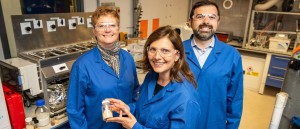A Bath firm developing biodegradable alternatives to harmful microplastics has won a £425,000 grant which could lead to its pioneering technology being produced on an industrial scale.
Naturbeads has received the money from Innovate UK, the government’s innovation body, to explore commercialising the product, which is made from cellulose, a naturally occurring substance that gives plants their strength and structure.

Unlike microplastics, once released into the environment as waste, the cellulose-based beads simply biodegrade into harmless sugars.
Microplastics – plastics less than five millimetres across – are used in a wide range of consumer and industrial products ranging from toothpaste and cosmetics to adhesives and paint and act as sensory agents, structuring agents or emulsifiers.
However, they are increasingly entering the human food chain and particles have been found in salt, fish, beer, drinking water and, alarmingly, even in a new mother’s placenta.
Some 5.25trillion particles of miroplastic are already in the world’s oceans and it is estimated that 250,000 tonnes of microplastics from cosmetics and paints end up in there every year – equivalent to 25bn plastic bottles.
Naturbeads co-founder and CEO Giovanna Laudisio, pictured, centre, with the Naturbeads team, said: “When we wash these products down the sink, the microplastics travel straight through wastewater treatment plants, which are unable to capture them, and then directly into the environment.
“We’re using the Innovate UK funding to explore the feasibility of producing microbeads on an industrial scale across industries such as cosmetics and paints but also cutting-edge applications like carriers for biocatalysis and edible scaffolding for cultured meat.”
Naturbeads’ growth is also being supported by Innovate UK’s EDGE service, which has provided constructive feedback on its pitch deck and business plan, as well as recommendations for key events.
Giovanna added: “The events have enabled us to present to corporates, both domestically and internationally, and begin fostering partnerships that could make us more attractive to future investors.”
She believes that the issue of microplastic pollution must be addressed urgently: “We must act now because future generations will not be able to remove microplastics from the environment, they’re just too small and too spread out across the globe.”



















